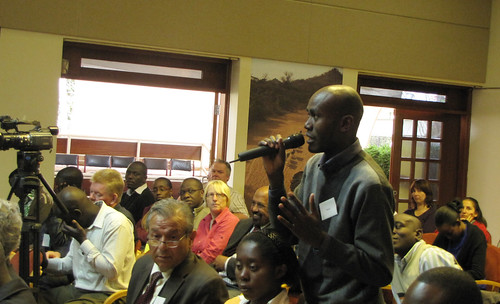A journalist at the CGIAR Media Briefing held on 1 September 2011 at ILRI: Experts have called for a strengthened and joined-up approach of addressing food crises in the Horn of Africa (photo credit: ILRI/Meredith Braden).
A panel of experts on the Horn of Africa has called for greater investment in agricultural development, greater support for agricultural research, and greater cooperation between research, government, private sector and development actors. These can speed the adoption of innovations by farmers and herders, helping millions of food producers in the Horn of Africa now facing the severest drought in this region in six decades.
Speaking today at a news briefing organized by the CGIAR Consortium of International Agricultural Research Centres, with the briefing hosted and backstopped by the International Livestock Research Institute (ILRI), in Nairobi, Kenya, the experts called for a ‘matching of investments in infrastructure development with investments in knowledge’ to get more research into use.
The experts were interviewed by more than 20 journalists on the subject of ‘Famine in the Horn of Africa: Challenges and Opportunities for Mitigating Drought-Induced Food Crises’. The experts were leaders of the Alliance for a Green Revolution in Africa, the CGIAR, the Kenya Agricultural Research Institute, the United States Agency for International Development (USAID) and the World Food Program.
‘It is not drought but vulnerability to drought that is eroding livelihoods in these areas,’ said Jeff Hill, Director of Policy, Bureau for Food Aid, at USAID. ‘And this vulnerability is largely a result of decades of under-investment in agriculture and sustainable food security in the region.’ This is despite the fact that livestock production in the arid and semi-arid lands in the Horn of Africa contributes 35–45 and 45–50 percent of agricultural gross domestic product (GDP) in Ethiopia and Kenya, respectively. ‘However,’ Hill said, ‘the current national development plans in Ethiopia and Kenya recognize the value of these regions and should be supported by all because they are offering a chance to build a coalition of support to sustainably address and tackle the challenges experienced in the arid and semi-arid lands.’
Mark Gordon, from the World Food Programme, co-chair of Somalia Interagency Food Cluster, reported that ‘Below-normal rainfall in recent seasons has dried up water points used for animals and crops, increased the prices of food and fuel, tightened global food supply chains, and led to more political- and resource-based conflicts.’
The solutions to the current problem ‘have been discussed for decades,’ noted the expert panel. It reminded the journalists that the current drought is not a ‘one-off event.’ The current problem offers an opportunity to ‘scale up the use of tested knowledge, and make research a key investment area,’ said Namanga Ngongi, president of the Alliance for a Green Revolution in Africa. He added that ‘We have to adapt agriculture to the changing nature of our environment, change our market structures to accommodate and promote drought-tolerant crops and we should consider adjusting our food habits to make better use of crops that are adapted to the region.’
The panel proposed the creation of commodity exchanges for food crops to help reduce speculation on food prices and widening insurance protection for livestock keepers to help them rebuild their livelihoods after drought. Other ways of helping to avert future food crises mentioned include the application of community-based emergency recovery and resilience-building interventions, such as sustainable land management programs, construction of soil banks and underground reservoirs. ‘There is need to use proven, tested and appropriate technologies to work with vulnerable households for “the next time, the next shock” happens,’ said Gordon.
‘The current drought is a warning shot, an early indication of the immense challenges that we face in the future, not only in [the Horn of Africa] but around the world,’ said Lloyd Le Page, CEO of the CGIAR Consortium. ‘Despite the challenges to livestock herding and crop farming in this region, we can prevent [food crises] from happening,’ said Le Page, ‘if we are willing to embrace research and policies that give farmers in the region the tools they need to be resilient in the face of increasing uncertainty.’
—
Find out more about the media briefing on the CGIAR Consortium website: http://consortium.cgiar.org/hoa/

